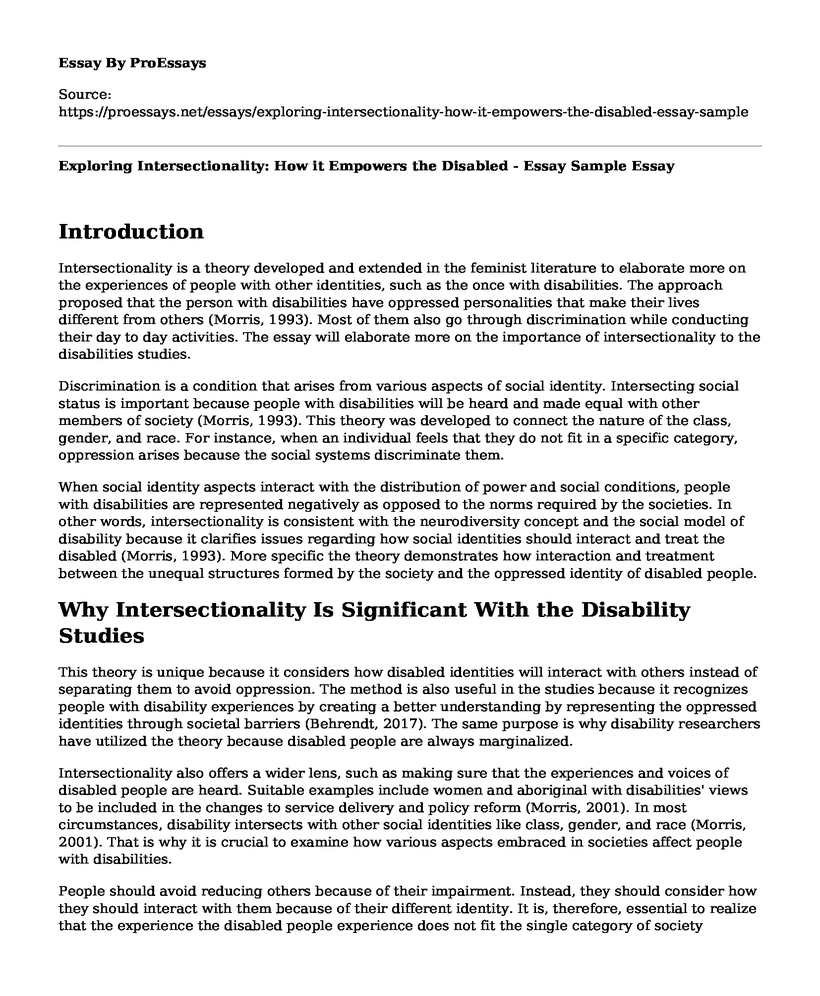Introduction
Intersectionality is a theory developed and extended in the feminist literature to elaborate more on the experiences of people with other identities, such as the once with disabilities. The approach proposed that the person with disabilities have oppressed personalities that make their lives different from others (Morris, 1993). Most of them also go through discrimination while conducting their day to day activities. The essay will elaborate more on the importance of intersectionality to the disabilities studies.
Discrimination is a condition that arises from various aspects of social identity. Intersecting social status is important because people with disabilities will be heard and made equal with other members of society (Morris, 1993). This theory was developed to connect the nature of the class, gender, and race. For instance, when an individual feels that they do not fit in a specific category, oppression arises because the social systems discriminate them.
When social identity aspects interact with the distribution of power and social conditions, people with disabilities are represented negatively as opposed to the norms required by the societies. In other words, intersectionality is consistent with the neurodiversity concept and the social model of disability because it clarifies issues regarding how social identities should interact and treat the disabled (Morris, 1993). More specific the theory demonstrates how interaction and treatment between the unequal structures formed by the society and the oppressed identity of disabled people.
Why Intersectionality Is Significant With the Disability Studies
This theory is unique because it considers how disabled identities will interact with others instead of separating them to avoid oppression. The method is also useful in the studies because it recognizes people with disability experiences by creating a better understanding by representing the oppressed identities through societal barriers (Behrendt, 2017). The same purpose is why disability researchers have utilized the theory because disabled people are always marginalized.
Intersectionality also offers a wider lens, such as making sure that the experiences and voices of disabled people are heard. Suitable examples include women and aboriginal with disabilities' views to be included in the changes to service delivery and policy reform (Morris, 2001). In most circumstances, disability intersects with other social identities like class, gender, and race (Morris, 2001). That is why it is crucial to examine how various aspects embraced in societies affect people with disabilities.
People should avoid reducing others because of their impairment. Instead, they should consider how they should interact with them because of their different identity. It is, therefore, essential to realize that the experience the disabled people experience does not fit the single category of society (Morris, 1993). Reflecting on the experiences disabled people go through will be the ideal way of dominating equality in society.
Conclusion
Even though intersectionality is a discourse that is embraced to comprehend the interaction of oppressed identities, it also mediates their sexual orientation, social class, and gender of people with disabilities. Disability, in this case, is the discourse that creates challenges to such individuals. This is the reason why the theory orients transparent practices that perpetuate inequality in societies. Even though the method was developed and extended in the feminist literature, it elaborates more on the experiences of people with disabilities.
References
Behrendt, L. (2017, September 11). Culturally Appropriate Disability Support. https://www.abc.net.au/radio/programs/speakingout/damian-griffis/8891600
Morris, J. (1993). Feminism and Disability. Feminist Review, 1(43), 57–70. doi: 10.2307/1395069
Morris, J. (2001). Impairment and Disability: Constructing an Ethics of Care That Promotes Human Rights. Hypatia: A Journal of Feminist Philosophy, 16(4), 1–16. doi: 10.1353/hyp.2001.0059
Cite this page
Exploring Intersectionality: How it Empowers the Disabled - Essay Sample. (2023, Aug 23). Retrieved from https://proessays.net/essays/exploring-intersectionality-how-it-empowers-the-disabled-essay-sample
If you are the original author of this essay and no longer wish to have it published on the ProEssays website, please click below to request its removal:
- Essay on Children Education in Homeless Families
- Brown Vs. Board of Education Essay Example
- The Indicators and the International Trends of Inequality in the U.S. - Paper Example
- Research Paper on Feminism and Public Nudity
- The Relationship of Trauma to Mental Disorders Among Trafficked and Sexually Exploited Girls and Women
- Drug Prescribing & Clinical Negligence: Mitigating Risk in Medical Facilities - Essay Sample
- Essay Sample on African-Americans: Cast Down Your Bucket Where You Are







